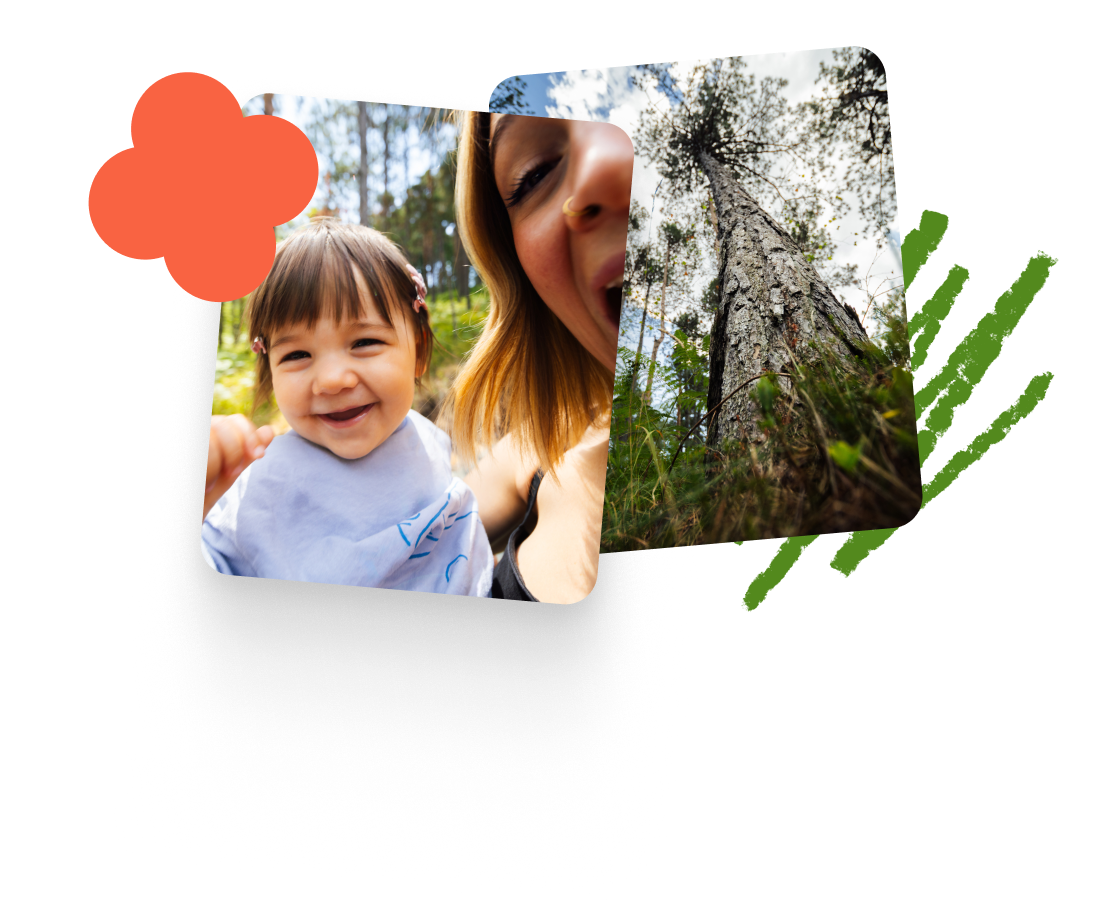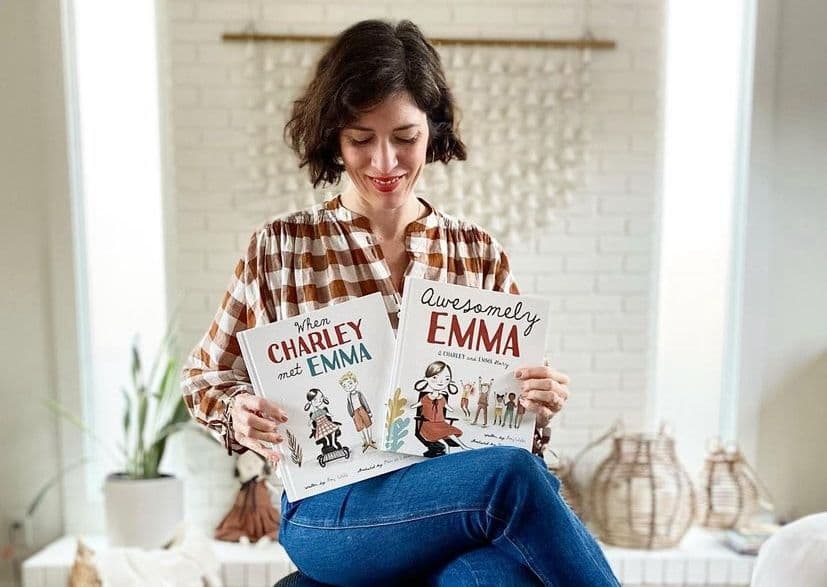
is now part of
Joy Parenting Club!
Families and care organisations using Heba will now have the option to also join Joy. For any questions, reach out to us at hello@heba.care

Families and care organisations using Heba will now have the option to also join Joy. For any questions, reach out to us at hello@heba.care

May 15, 2024
As we celebrate a new Charley and Emma story, author, artist and advocate Amy Webb keeps conversations flowing around disability.
Dr. Seuss said: “The more that you read, the more things you will know.” And thanks to the efforts of another American children’s book author, Ohio’s Amy Webb, families across the globe are learning what inclusion looks like.
Amy’s award-winning Charley and Emma series follows the friendship of its young protagonists – non-disabled Charley, and Emma, a wheelchair user with limb difference. Gorgeously illustrated by Merrilee Liddiard, these books teach kids (and adults) to question and challenge physical and attitudinal barriers around disability – an inclusive approach that their author has long been advocating.

Emma’s character is based on the middle of Amy’s three daughters, Grace, who was born with a condition called microgastria and limb reduction complex. Soon after Grace came along, Amy – a writer and artist by trade – turned the focus of her blog, This Little Miggy Stayed Home, to the disability community. She’s since interviewed hundreds of fellow caregivers and, in 2019, released her first children’s book, When Charley Met Emma , which would be followed by Awesomely Emma in 2020.
Recent years have seen Amy assisting with her community to build an inclusive playground, opening a sticker shop in uptown Cincinnati and co-authoring the newly-launched third installment of the Charley and Emma series, Emma’s Awesome Summer Camp Adventure, with now 13-year old Grace.
Amy chats with us about how this new book came to be, the power of disability representation and how accessibility starts “with a changed heart.”

Firstly, huge congrats on the new book! What was it like working with Grace?
I didn’t want her to feel pressure, or that she needed to do this. But Grace had expressed once, a while ago, wouldn’t it be fun if we wrote the books together? And it did end up being really fun. I mean, she was sort of like, “Writing a book sounds like homework." So I said, listen, I’ll do the actual writing part. We’ll talk about the ideas, I’ll put pen to paper and then you can come back in during the editing process and make changes – and she was much more okay with that. Her vision, thoughts and ideas are on every page of that book.
What inspired this particular story, set at a summer camp?
When we first talked about it I told Grace that it helps me, when I’m doing these books, to think about where I want them to take place. The first one was in a park, in a public space. The second one was at a school and then at a museum. For the third one, we wanted to talk about accessibility again and we thought, what if Charley and Emma are on vacation? What if they are on camp?
We had also watched the movie Crip Camp [which documents experiences from disabled teens at a summer camp, including the late Judith Heumann, who would become leaders in the disability rights movement] and wanted to pay homage to this group of people. I had sent Judy Heumann my first two books – which was nerve wracking – and she was lovely. When Grace was in sixth grade, she did a report on Judy and got to interview her. They had an hour-long conversation and it was just amazing.
Charley and Emma are growing up and learning a lot in these books. How is this reflected in your storytelling?
I think you can really see, in the books, a progression in how disability is framed. When I go into schools and read the books, it’s uncomfortable for me to read When Charley Met Emma. Kids gasp when Charley says, “Why does she look so weird?” and I’m glad that they have that reaction. There is that discomfort in the book and it’s intentional.
The next book is about accessibility – there’s still this problem, even though I make it very clear in the book that accessibility is the problem, not Emma’s wheelchair.When it came to this third book, we didn’t want to have a big problem like that. We just wanted this to be a celebration of all these awesome kids and to show what it's like to imagine a world where everything is as accessible as possible. There are a couple little problems, but they're problems every kid can have – like facing your fears and that kind of stuff.
It was just really fun to be celebratory and inclusive and feature a bunch of different kids and imagine a place that’s open to everyone. Because as much as I love that Grace gets to go to camp, it’s in a place that we have to drive two days to get to, you know? It’s organised through the hospital where she sees doctors for limb differences. She can’t just go to the camp that her sisters get to go to here.

As you say, Emma’s Awesome Summer Camp Adventure features both disabled and non-disabled kids. How can we teach all kids about inclusion?
Bring representation into your home – and books are a great way to do that. I think there’s such power in having a book with a character like Emma, who looks a lot like my daughter, sitting on the same shelves as hungry caterpillars and wild things. For lack of a better word, there’s a normalisation there. Disability isn’t so shocking and surprising.
As Grace was growing up, that double-take, shock response took up so much air in our lives. When we went out in public it was like, okay, are we geared up for this today? I would want to go out with a sign that said, “Do this, don’t do this,” you know? And so the first book was like my sign.
I always hoped that When Charley met Emma would be an invitation for discussion. Like, if your kid wants to stare at a kid with limb differences in a book in your home, go for it. They can do that all day long and they can ask you all the questions. Books are a really powerful tool for starting those conversations.
Outside of their homes, how can families of non-disabled children include our kids socially?
If there’s a party or something you’re not sure that a kid can participate in, always ask. Don’t just assume they can’t do it.
So for me, a classic example was when my daughter was in first or second grade and one of her best friends wanted to have a roller skating party. Her mum thought, well, I know she wants Grace there, but she’s in a wheelchair, so she can’t roller skate. But I was so grateful for this mum then thinking, that’s not the answer, I just need to call Amy and discuss this.
The cool thing was that we had gone roller skating a couple times. We would borrow the walker from our school and Grace would push herself and go zooming around. It’s not something she would do anymore, but at that age, she loved it. So I was grateful that this mum didn’t just say, well, obviously she can’t participate. She reached out and asked.

Grace has clearly got a great group of friends around her. Is social inclusion ever an issue for your family, these days?
You’ve got to keep having these discussions. I had my own, false idea that if you get kids when they’re young, then they’ll always be inclusive. It’s unfortunately not true. I hate to break it to you, but you still have kids that – no matter how well they’ve been taught or how well they know better – will make jokes at other people’s expense.
I once did a social media post specifically about this, where I wrote something like, if you would be horrified at your kid making a racist joke, or a joke about LGBTQI+ kids, or even just a sexist joke, be equally horrified if you see them doing that around disability. I’m not saying that we’ve solved racism or homophobia or any of those other things. It just seems that too many kids still learn that disability is a totally acceptable punchline. Thankfully, Grace has a great group of friends.
Do you think the fully inclusive camp that you’ve depicted in Emma’s Awesome Summer Camp Adventure could be possible in real life, in the future?
Yeah, one hundred percent. Going back to these early disability activists, so much of the hard work has already been done. So I do think it’s possible. The tricky thing is that, sure, you can have the Americans with Disabilities Act, but in practice it’s still easy for businesses and the public not to follow it because it’s not like you call the accessibility police and they get a ticket.
Every single ramp that’s ever built, every single piece of accessibility starts with a changed heart. You’ve got to get people really on board with the vision of accessibility – because people think it’s just a small sliver of society who will benefit, right? You’ve got to get people passionate about this benefiting so many of us in ways we couldn’t have imagined.
You can find the Charley and Emma series wherever you like to buy books online. Follow Amy’s work via her website and Instagram account.